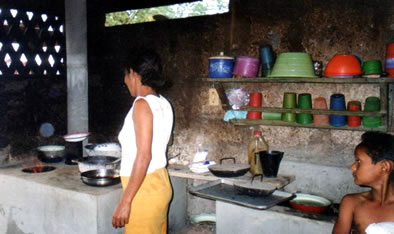SOFONic The focuses of their work (part 3)
"Remember, we have not inherited the world from our ancestors, rather, we have received it on loan from our children"
We seek to adapt new technologies that foster soil improvement with the aim of environmental protection. Focuses include symbiotic planting of sorghum and sesame, use of organic fertilizers, integrated management of plagues, conservation of soil and water, fencing with plants, building of irrigation ditches, alternating pastures, and improved breeding of livestock. Energy-producing forests are complemented by means to guarantee wise use of firewood through improved cooking stoves.

The principal components include of the work include:
· Education for producers
· Strengthening community organization
· Technology transfer
· Gender focus
· Organic trees and crops
· Energy and industrial reforestation
· Natural irrigation systems
· Technical assistance
· Improved treatment of entire ecosystem
· Forestry management
· Organically grown coffee
· Natural regeneration
· Genetic improvement of livestock
· Construction of improved cooking stoves

Capacitating and strengthening organizations: Development of local capacity in the communities helps the farmers to understand the problems, their causes and effects, as well as their detrimental implications for systems of production and standard of living. In this way they see the importance of organizing themselves and become designers of the development process in their communities, embracing social, economic, political and productive aspects.
Technology transfer: Adoption of new and appropriate technologies that are adequate to the agricultural and environmental culture contribute to the protection and/or conservation of resources, the soil, flora, fauna and environment together.

Gender focus: Priority is given to gender issues, by identifying different activities for women and men and the aspects that are to be improved in the male and female roles within the context of production, reproduction and community. It embraces activities that seek to develop and preserve the potential productivity of the communities and how these changes will affect the population.
Agriculture: Within this sub-system of production living fences are installed using roots, sticks and plants. The area is protected with fences and terraces; in the upper part of the terrace living fences are made with bushes, thereby allowing small paths of leguminous trees to grow in the curves.

Reforestation: Compact plantations are defined with forestry plants, and nurseries are installed with species adapted to the zone. A monitoring process assesses the environmental impact.
Technical assistance to producers/beneficiaries: Besides the days in the field, direct technical assistance to the beneficiaries addresses the specific problems that affect the productive capacity of the plantations. These are identified during the productive diagnosis, and interest groups in each community are formed in a manner integrated with the family production thereby allowing adequate agricultural management of the small family farms.
It seeks to establish conditions that would increase social, economic and productive investment in the municipalities, growth of employment, increased production, profitability and income of the farms along the path to a continuous socio-economic development.
Grazing systems: Within this sub-system we establish a new pasture area that incorporates improved seeds for the pasture with forestry plants, and that serve as both shade and feed for cattle in the summer, and from which an increase in livestock production yields is expected.

Forestry management: This takes advantage of the existing forests and the species that grow naturally, and enrich them with seeds of native plants collected directly by the producers of the zone. Forestry management is improved to ensure the permanence of goods, services and the eco-system, as well as the profitability of the communities and the country in general.
Ecoforestal coffee: This is a system whereby coffee and fruit trees are combined and organically managed from the planting through to the harvest, thus obtaining a healthy coffee harvest, free of toxicants and without contaminating the environment, eliminating the damaging inputs and practices. In addition, the farmers can sell their fruit and coffee at the same time.
Management of natural regeneration: This is a natural process to ensure the survival of the forests. The selected farms have remnants of forests, mainly in the areas of the streams and small ravines, which protect the natural management of water as well as the wildlife. The process favors growth and increases the quantity of plants for precious woods as well as determines the conditions essential to ensure future harvests. Where there is severe deforestation the area is enriched with forestry plants.



